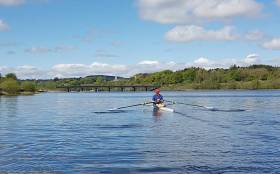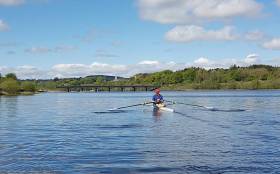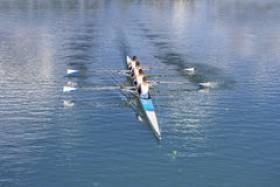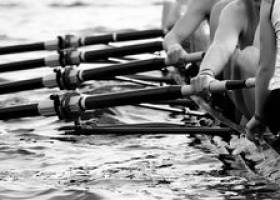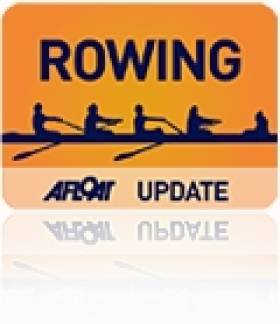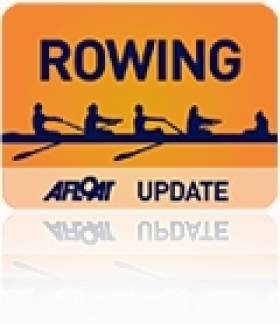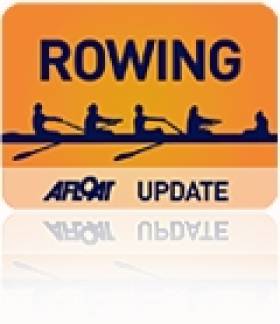Displaying items by tag: Blessington
#Rowing: The agm of Rowing Ireland was businesslike and brief – coming in under an hour.
Neville Maxwell, the chair of the high performance committee, praised the “energy and enthusiasm” of high performance director Antonio Maurogiovanni. “He wants a system which is open and transparent,” he said.
Maxwell said that there was a move away from lightweight rowing and it was essential to build a programme which would last. Finding new sources of income was very important.
Leo Gibson replaced outgoing treasurer Dan Buckley, who has stepped down. The Old Collegians man spoke of the hope of drawing down Large Scale Sports Infrastructure grants.
Rowing Ireland president Eamonn Colclough said the priority was to finance work on the National Rowing Centre, with the hope of replacing the slips and, perhaps, the buoyed course. Next in priority would be Lough Rinn and then the proposed new Blessington course.
Colclough said that he hoped there was a big uptake on the package deal which will give Irish spectators a good way to travel to the World Rowing Championships in Linz in Austria in August/September. “I would love to hear The Fields of Athenry ring out over the waters in Linz,” he said.
Rowing Ireland is preparing to facilitate clubs using Lough Rinn by taking over the insurance requirements asked for by Leitrim County Council. The Council will “spend hundreds of thousands of euro” on developing the course and surrounds, Colclough told the agm.
The fixtures calendar for 2020 emerged in a very similar form to the one proposed. Erne Head moved to a week earlier than scheduled and will now take place on March 7th and the Castleconnell Sprint Regatta takes a similar step to May 9th. Carlow’s Dambuster Head is set to take place on February 1st.
Galway Regatta (June 6th) and Shandon Masters Regatta (August 15th) were late additions to the draft calendar put before delegates.
Awards
President’s: Seamus Scully, Carlow
Connacht: Paul Gallen
Leinster: Gerry Conway, Frank Moore, Willie Ryan, Mick Carney, Andrew Coleman
Munster: Brian Sheppard
Ulster: Jeremy Johnston
Dambuster Head Cancelled Due to Forecast of Strong Winds
#Rowing: The Dambuster Head of the River, scheduled for this Saturday, January 26th, at Blessington Lakes, has been cancelled. The organisers, Carlow Rowing Club, say that they had to take into account the forecast of strong winds. As the week wore on, the weather forecast worsened. Today (Thursday), the prediction was for winds of 33 kilometres at the venue on race day.
#Rowing: Metro Regatta has been cancelled. The weather forecast was for winds to rise to 20 to 25 kilometres in the afternoon at Blessington – with gusts. The organisers felt that these conditions might have made it unsafe to row. The cancellation is the third of a major regatta, following Skibbereen and Lough Rinn.
Weather Takes Out Dam Buster Head
#Rowing: The Dam Buster Head of the River, scheduled for this Saturday, December 16th, has been cancelled. The weather forecast for Blessington was not good, and the organisers chose to abandon the event because of safety concerns. It was the inaurgural Dam Buster Head, run by Carlow Rowing Club.
Neptune Head of the River is Off
#Rowing: Neptune Head of the River, scheduled for Saturday, November 5th on Blessington Lakes has been cancelled. The organisers say that the forecast of high winds at the venue meant they could not continue with the event. A big part of the entry consisted of junior crews – there were 20 entries in the men’s junior 18 single sculls.
Neptune Head Set to Go Ahead
#Rowing: The organisers of the Neptune Head of the River this Saturday, December 30th, have decided to go ahead with the event. The weather forecast is for winds of 12 to 20 kilometres per hour at Blessington, which would leave the course rowable. The course has to be laid, and there is a chance that the event could yet be cancelled, but only if the weather forecast changes significantly.
Forecast of Strong Gusts Forces Cancellation of Neptune Head
#Rowing: The Neptune Head of the River, scheduled for this Saturday, November 7th, has been cancelled. The weather forecast for the course at Blessington predicted gusts of up to 40 kilometres per hour, forcing the organisers to take the option of calling off the event.
#ROWING: Commercial won the battle of the men’s quadruples at Dublin Metropolitan Regatta. The established unit were tested by Skibbereen down the Blessington course, but won well. The experienced oarsman in the Old Collegians boat, with Albert Maher joining Sean Jacob, Dave Neale and Eimantas Grigalius, finished third. The NUIG/Grainne Mhaol men’s senior eight set a good time while winning the Division One final, despite being clearly superior to their intermediate opposition. UCD provided the top women’s pair and four. The women’s single had a strange set of finals. Elise Maurin won her heat but the progression by fastest time (of which she was unaware) consigned her to the B Final – which she won in a much faster time than set by junior competitor Erin Barry in winning the A Final.
The new timing system for heats worked well and the regatta ran exactly to schedule in excellent conditions.
Dublin Metropolitan Regatta, Blessington, Saturday
Men
Eight – Division One – A Final: NUIG/Grainne Mhaol (sen) 6:11.863, 2 Rudergesellschaft Wiking Berlin (inter) 6:21.173, 3 UCD (inter) 6:22.163; 4 St Michael’s (jun 18A) 6:41.850.
Div Two – A Final: 1 Cork BC (Club Two) 6:15.297, 2 NUIG (Club Two) 6:15.873, 3 Commercial (Club Two) 6:22.777; 4 UCD (Nov) 6:21.543; 5 Col Iognaid (jun 16) 6:40.310.
Four – Division One – A Final: 1 NUIG/Grainne Mhaol (sen) 6:21.603, 2 Commercial (sen) 6:28.590, 3 Carlow (sen) 6:39.810.
Four, coxed – Div One – A Final: 1 Rudergesellschaft Wiking Berlin (inter) 6:48.173, 2 Skibbereen (inter) 6:51.123, 3 UCD A (inter) 6:52.57; 5 UCD A (Club One) 7:09.843, 6 Athlunkard (jun 18A) 7:12.387. B Final: CAI (jun 18A) 8:37.280. Div Two – A Final: 1 Skibbereen (Club Two) 7:06.850, 2 NUIG A (Club Two) 7:18.223, 3 Col Iognaid A (jun 16) 7:27.490. B Final: 1 UCD (Club Two) 7:22.253; 3 Lee (jun 18B) 7:46.653.
Pair – Division One – A Final: 1 Carlow (sen) 7:00.373, 2 St Michael’s (sen) 7:01.760, 3 Carlow (inter) 7:09.357; 4 St Michael’s A (jun 18A) 7:12.590. B Final: 1 UCD A (inter) 7:14.300, 2 St Michael’s (Club One) 7:17.827.
Sculling,
Quadruple – Div One – A Final: 1 Commercial (sen) 6:31.557, 2 Skibbereen (sen) 6:34.490, 3 Old Collegians (sen) 6:36.673; 5 Cork BC (jun 18A) 6:49.217. Div Two – A Final: 1 Cork BC 6:59.537, 2 Lee (jun 16) 7:04.77, 3 Cork BC (jun 18B) 7:06.493. B Final: Graiguenamanagh (jun 18B) 7:39.147; 2 Commercial (club two) 7:46.617. C Final: Neptune (nov) 8:33.443.
Double – Div One – A Final: 1 Old Collegians (sen) 7:07.373, 2 UCD/Portadown (sen) 7:11.603, 3 St Michael’s (inter) 7:13.740; 4 Garda (Club One) 7:15.670. B Final: Lee (jun 18A) 7:59.930. Div Two – A Final: 1 Shandon B (Club Two) 7:30.470, 2 Waterford (Club Two) 7:46.707, 3 Three Castles (jun 16) 7:47.227; 5 St Michael’s (jun 18B) 7:57.393. B Final: Skibbereen (jun 18B) 8:08.357.
Single – Div One – A Final: 1 Skibbereen (E Rowan, sen) 7:23.600, 2 Portadown (S McKeown, sen) 7:23.817, 3 Garda (D Kelly, inter) 7:33.333. B Final: 1 Shandon (S O’Sullivan; jun 18A) 7:40.700; 5 Garda (R Allen; Club One) 7:47.357. C Final: 1 UCD (R O’Sullivan; Club One) 7:46.767. Div Two – A Final: 1 Skibbereen (K Mannix, jun 18B) 7:48.270, 2 Commercial (E Meehan, jun 16) 7:54.950, 3 Graiguenamanagh (A Lennon, jun 18B) 7:57.740; 5 Shandon (D Smith, Club Two) 8:00.627. B Final: Castleconnell (A Mozdzer, Club Two) 8:04.933. C Final: Graiguenamanagh (K Scully, jun 18B) 8:05.560.
Women
Eight – Division One – A Final: 1 Skibbereen (jun 18A) 7 mins 6.773 secs, 2 Trinity (sen) 7:13.667, 3 St Michael’s (jun 18A) 7:15.690; 4 Trinity B (Club One) 7:55.210. Division Two – A Final: 1 Commercial (Club Two) 7:32.520, 2 Shandon (jun 16) 7:43.393, 3 NUIG (Club Two) 7:44.207; 4 Galway (Jun 18B) 7:46.857. B Final: 1 Commercial (jun 16) 7:59.867; 2 Trinity (nov) 8:10.273.
Four – Div One – A Final: 1 UCD (sen) 8:25.937, 2 Skibbereen (jun 18A) 8:26.170, 3 NUIG (sen) 8:33.670.
Four, coxed – Div One – A Final: 1 UCD B (inter) 7:20.803, 2 UCD A (inter) 7:24.170, 3 NUIG (inter) 7:28.417. Div Two – A Final: 1 NUIG (Club Two) 8:01.323, 2 Commercial (Club Two) 8:16.833, 3 Athlunkard (Club Two) 8:28.237.
Pair –Div One – A Final: 1 UCD (sen) 8:31.340, 2 Commercial B (inter) 8:34.460, 3 Bann (jun 18A) 8:39.267. B Final: 1 St Michael’s (jun 18A) 9:05.617; 2 Athlunkard (Club One) 9:31.823.
Sculling
Quadruple – Div One – A Final: Lee (jun 18A) 7:10.203, 2 Skibbereen (jun 18A) 7:14.900, 3 Bann (jun 18A) 7:15.943; 4 Carlow (Club One) 7:32.560. Div Two – A Final: 1 Commercial (jun 16) 7:38.500, 2 Shandon A (jun 16) 7:46.817, 3 Garda (Club Two) 7:50.140; 5 Cork BC (jun 18B) 7:54.523. B Final: Commercial A (nov) 7:57.957.
Double – Div One – A Final: 1 Skibbereen (jun 18A) 7:35.167, 2 Bann (jun 18A) 7:42.297, Skibbereen (sen) 8:12.747; 4 Castleconnell (Club One) 8:14.730. Div Two – A Final: 1 Bann (jun 18B) 8:00.347, 2 Garda (Club Two) 8:12.923, 3 Carlow (jun 18B) 8:48.290; 5 Castleconnell (jun 16) 9:10.130. B Final: Castleconnell (jun 18B) 9:00.677.
Single – Division One – A Final: 1 Bann (E Barry; jun 18A) 9:06.307, 2 Lee (C Synnott; jun 18A) 9:09.533, 3 Bann (B Mullin; jun 18A) 9:20.487. B Final: 1 New Ross (E Maurin; sen) 9:00.437; 2 St Michael’s (A O’Sullivan; inter) 9:01.187, 3 Fermoy (S Bouanane; Club One) 9:19.283. C Final: Skibbereen (B Walsh; sen) 9:41.843.
Div Two – A Final: 1 Bann (H Scott; jun 16) 9:02.560, 2 Bann (F Chestnutt, jun 18B) 9:12.593, 3 Garda (S Kenny, Club Two) 9:20.207. B Final: Castleconnell (R Kilkenny; Club Two) 11:35.533. C Final: Fermoy (A Collins; Club Two) 9:39.823.
Rowan Powers Past McKeown on the Line at Metro
#ROWING: Eric Rowan of Skibbereen beat Sam McKeown of Portadown by less than a quarter of a second in the A Final of the men’s Division One single sculls at Dublin Metropolitan Regatta today. Rowan had a marginal lead over McKeown for much of the race, but the big Portadown eked out a lead coming up to the line, only for Rowan to finish better. The Division Two men’s eights A Final was also very close, with Cork Boat Club passing NUIG to win. NUIG/Grainne Mhaol came out on top in the men’s Division One fours, and Carlow in the pairs.
The junior women of Skibbereen were the best women’s eight on the day, while Aoife Casey and Emily Hegarty – also juniors – were the fastest women’s double. Conditions were excellent, with bright sunshine and a light headwind.
Dublin Metropolitan Regatta, Blessington, Saturday
Men
Eight – Div Two – A Final: 1 Cork BC (Club Two) 6:15.297, 2 NUIG (Club Two) 6:15.873, 3 Commercial (Club Two) 6:22.777; 4 UCD (Nov) 6:21.543; 5 Col Iognaid (jun 16) 6:40.310.
Four – Division One – A Final: 1 NUIG/Grainne Mhaol (sen) 6:21.603, 2 Commercial (sen) 6:28.590, 3 Carlow (sen) 6:39.810.
Four, coxed – Div One – A Final: 1 Rudergesellschaft Wiking Berlin (inter) 6:48.173, 2 Skibbereen (inter) 6:51.123, 3 UCD A (inter) 6:52.57; 5 UCD A (Club One) 7:09.843, 6 Athlunkard (jun 18A) 7:12.387. B Final: CAI (jun 18A) 8:37.280.
Pair – Division One – A Final: 1 Carlow (sen) 7:00.373, 2 St Michael’s (sen) 7:01.760, 3 Carlow (inter) 7:09.357; 4 St Michael’s A (jun 18A) 7:12.590. B Final: 1 UCD A (inter) 7:14.300, 2 St Michael’s (Club One) 7:17.827.
Sculling,
Single – Div One – A Final: 1 Skibbereen (E Rowan, sen) 7:23.600, 2 Portadown (S McKeown, sen) 7:23.817, 3 Garda (D Kelly, inter) 7:33.333. Div Two – A Final: 1 Skibbereen (K Mannix, jun 18B) 7:48.270, 2 Commercial (E Meehan, jun 16) 7:54.950, 3 Graiguenamanagh (A Lennon, jun 18B) 7:57.740; 5 Shandon (D Smith, Club Two) 8:00.627. B Final: Castleconnell (A Mozdzer, Club Two) 8:04.933. C Final: Graiguenamanagh (K Scully, jun 18B) 8:05.560.
Women
Eight – Division One – A Final: 1 Skibbereen (jun 18A) 7 mins 6.773 secs, 2 Trinity (sen) 7:13.667, 3 St Michael’s (jun 18A) 7:15.690; 4 Trinity B (Club One) 7:55.210.
Four, coxed – Div One – A Final: 1 UCD B (inter) 7:20.803, 2 UCD A (inter) 7:24.170, 3 NUIG (inter) 7:28.417. Div Two – A Final: 1 NUIG (Club Two) 8:01.323, 2 Commercial (Club Two) 8:16.833, 3 Athlunkard (Club Two) 8:28.237.
Sculling
Quadruple – Div One – A Final: Lee (jun 18A) 7:10.203, 2 Skibbereen (jun 18A) 7:14.900, 3 Bann (jun 18A) 7:15.943; 4 Carlow (Club One) 7:32.560. Div Two – A Final: 1 Commercial (jun 16) 7:38.500, 2 Shandon A (jun 16) 7:46.817, 3 Garda (Club Two) 7:50.140; 5 Cork BC (jun 18B) 7:54.523. B Final: Commercial A (nov) 7:57.957.
Double – Div One – A Final: 1 Skibbereen (jun 18A) 7:35.167, 2 Bann (jun 18A) 7:42.297, Skibbereen (sen) 8:12.747; 4 Castleconnell (Club One) 8:14.730.
Div Two – A Final: 1 Bann (jun 18B) 8:00.347, 2 Garda (Club Two) 8:12.923, 3 Carlow (jun 18B) 8:48.290; 5 Castleconnell (jun 16) 9:10.130. B Final: Castleconnell (jun 18B) 9:00.677.
St Michael's Fastest at Neptune Head of the River
#ROWING: The St Michael’s senior men’s eight were the fastest crew at the Neptune Head of the River at Blessington today, setting a time of 12 minutes and nine seconds in the first of the two heads. Lisa Dilleen was the outstanding woman competitor, winning the senior single sculls. The conditions were variable, with the second head going off in heavy rain and a headwind – only for the weather to clear as the head went on.
Neptune Head of the River, Blessington (Selected Results)
Overall: 1 St Michael’s senior eight 12 mins 9 secs (first head), 2 UCD/Neptune sen eight (1st hd) 12:10, 3 UCD, Lee, Neptune sen eight (1st) 12:16, 4 UCD, Neptune sen eight (2nd) 12:52, 5 Carlow sen four (1st) 12:56, 6 Old Collegians, UCD, Commercial sen eight (2nd) 12:56.
Men
Eight, Senior: 1 St Michael’s (first head) 12:09, 2 UCD, Neptune (1st) 12:10, 3 UCD, Lee, Neptune (1st) 12:16. Club Two: Commercial (1st) 13:24. Junior 16: Commercial (1st) 13:54. Junior 18: Portora A (2nd) 13:54. Masters: Commercial, Old Collegians (2nd) 14:17.
Four – Senior: 1 Carlow (1st) 12:56, 2 UCC (1st) 13:13, 3 NUIG, St Joseph’s (1st) 13:35. Intermediate: 1 Trinity A (1st) 13:07, 2 Trinity B (1st) 13:17, 3 Trinity B (2nd) 13:55, 4 Neptune (1st) 13:57. Club Two: NUIG (1st) 14:39. Junior 18: Portora (1st) 14:51.
Pair – Senior: 1 NUIG A (1st) 14:01, 2 NUIG, Lee (1st) 14:22, 3 NUIG B (1st) 14:36.
Sculling, Quadruple – Club Two: Offaly (2nd) 17:25. Junior 16: Three Castles (1st) 14:36.
Double – Senior: 1 UCC (2nd) 14:39, 2 Castleconnell (2nd) 14:39, 3 Garda (1st) 14:57.
Single – Senior: 1 Univ of Limerick (D Quinlan) (1st) 15:15, 2 Castleconnell (A Prendergast, 2nd) 15:22, 3 NUIG (L Keane, 1st) 15:23. Intermediate: 1 Garda (D Kelly, 1st) 15:36, 2 St Michael’s (D O’Connor, 2nd) 15:38, 3 Garda (Kelly, 2nd) 15:39, 4 Commercial (F Groome, 1st) 15:40. Junior 18: 1 Portora (E Murray, 1st) 15:54, 2 Belfast BC (A Murray, 1st) 16:08, 3 Carlow (O Nolan, 1st) 16:19.
Women
Eight – Senior: 1 Trinity (1st) 13:46, 2 Trinity (2nd) 14:07, 3 Commercial, Trinity (1st) 14:18. Intermediate: Trinity (1st) 14:11. Club Two: 1 Carlow (1st) 15:59, 2 Commercial (1st) 19:50, 3 Commercial (2nd) 21:29. Junior 18: 1 Portora A (1st) 14:36, 2 Neptune (1st) 14:56, 3 Carlow (1st) 15:14.
Four – Intermediate: 1 UCC (1st) 15:49, 2 NUIG A (1st) 15:53, 3 Trinity (2nd) 16:02. Club Two: Trinity (1st) 16:54. Junior 18: St Michael’s (2nd) 16:21.
Pair – Senior: 1 Portora A (2nd) 16:36, 2 Portora B (2nd) 17:17, 3 UCC (2nd) 18:13.
Sculling, Quadruple – Club Two: 1 Carlow (2nd) 16:40, 2 Garda (1st) 17:14, 3 Cork (1st) 17:46. Junior 16: Offaly (1st) 16:56.
Double – Senior: 1 Trinity (2nd) 15:55, 2 Belfast BC (2nd) 16:30, 3 Garda (2nd) 19:01.
Single – Senior: 1 Gráinne Mhaol (L Dilleen, 1st) 15:55, 2 Gráinne Mhaol (Dilleen, 2nd) 16:01, 3 Trinity (R Morris, 1st) 16:39. Intermediate: 1 St Michael’s (H O’Sullivan, 1st) 17:33, 2 Belfast BC (S Quinn, 1st) 17:41, 3 Neptune (L Leahy-Bailey, 1st) 19:04. Junior 18: 1 St Michael’s (S Murphy, 1st) 17:39, 2 Carlow (A Byrne, 2nd) 18:04, 3 Belfast BC (O Blundell, 1st) 18:10.


























